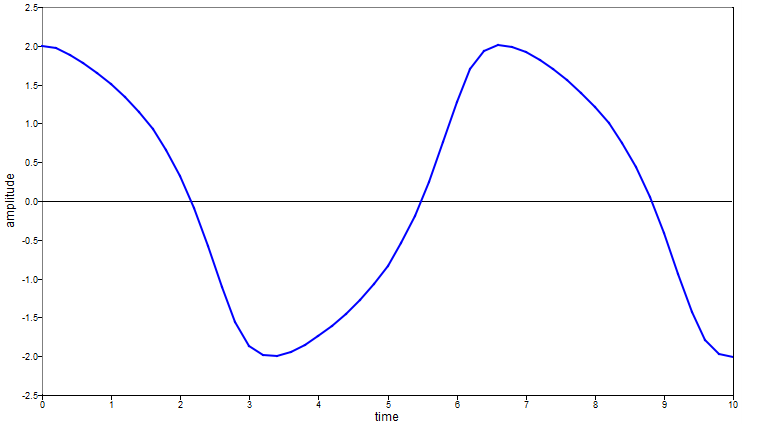ode15s
Solve a system of stiff differential equations.
Syntax
[t,y] = ode15s(@func,tin,y0)
[t,y] = ode15s(@func,tin,y0,options)
[t,y,te,ye,ie] = ode15s(...)
Inputs
- func
- The system of equations to solve.
- tin
- The vector of times (or other domain variable) at which to report the solution. If the vector has two elements, then the solver operates in single-step mode and determines the appropriate intermediate steps.
- y0
- The vector of initial conditions.
- options
- A struct containing options settings specified via odeset.
Outputs
- t
- The times at which the solution is computed.
- y
- The solution matrix, with the solution at each time stored by row.
- te
- The times at which the 'Events' function recorded a zero value.
- ye
- The system function values corresponding to each te value.
- ie
- The index of the event that recorded each zero value.
Example
Solve the Van Der Pol oscillator. This example is not stiff, but becomes stiff for large values of mu.
function dy = VDP(t,y,mu)
% y = [x, dx/dt]
dy = [0, 0];
dy(1) = y(2);
dy(2) = mu * (1.0 - y(1)^2) * y(2) - y(1);
end
mu = 1.0; % mass
handle = @(t,y) VDP(t,y,mu);
t = [0:0.2:10]; % time vector
yi = [2, 0];
[t,y] = ode15s(handle,t,yi);
x = y(:,1)';
plot(t,x);
xlabel('time');
ylabel('amplitude');

Figure 1. ode15s figure 1
Comments
ode15s solves the system using the backward differentiation formula algorithm from the Sundials CVODE library.
To pass additional parameters to a function argument, use an anonymous function.
- RelTol: 1.0e-3
- AbsTol: 1.0e-6
- Jacobian: []
The 'Events' function used with the last three output arguments is specified using odeset.